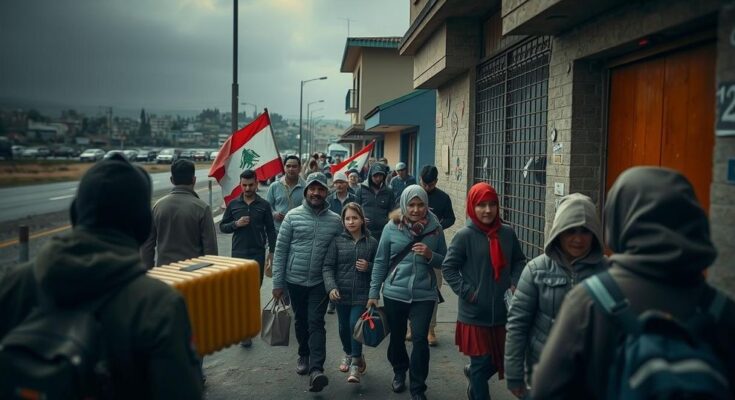Following a recently brokered ceasefire, Lebanese refugees who had fled to Iraq due to the conflict between Israel and Hezbollah are beginning to return to their homes in southern Lebanon. Although the ceasefire has provided an opportunity for repatriation, many face the stark realities of destroyed infrastructure and uncertain futures. Both hope and hesitation characterize the sentiments of those making the journey back home.
Lebanese families who had sought refuge in Iraq due to the escalating conflict between Israel and Hezbollah are now returning to their homes in southern Lebanon following a recently negotiated ceasefire. The cessation of hostilities has initiated the return journey for many, despite considerable destruction awaiting them. Notably, Ali Abdulla, a resident from southern Lebanon, expressed determination, stating, “After two months, we are returning to our homeland. We will return even if we find our homes destroyed; we will sit on the ground.”
Official reports indicate that over 20,000 Lebanese individuals fled to Iraq as the war intensified, yet now many are opting to leave for Beirut or travel via government-sponsored buses to cross into Lebanon through Syria. Although airport officials reported an influx of about 800 Lebanese flying to Beirut weekly, recent escalations in the Syrian conflict have made land routes perilous. The Iraqi government, alongside local Shi’ite organizations, has provided essential support such as accommodation, healthcare, and meals for the displaced families.
The ceasefire, mediated by the United States and France, has brought surprising quickness to the return of displaced families. Yousef Barakat, another individual at Najaf airport, remarked, “Returning home was faster than we expected. A ceasefire has been achieved. We, the southerners, have not and will not abandon our land.” However, the situation remains dire for many returning families, as significant infrastructure damage has rendered their homes uninhabitable. Rabea Ali, a mother of four, voiced her concerns, stating, “I no longer have a home; everything is destroyed. If we return, where will we sleep, on the street? What is the future of our children if they stay in Lebanon? No education, no future, and no home.”
The sentiments of uncertainty are echoed by Rabea’s son, Omar, who has adapted to life in Baghdad and expressed a desire to relocate his family to safety, stating, “We ran from bombing and devastation. I’m working to collect enough cash to bring my family, who are stuck in Lebanon, to live together here.” Meanwhile, eleven-year-old Ali Hassan longs for his homeland, wishing to pray at the grave of a friend who perished in an Israeli airstrike, demonstrating the deep personal ties that motivate many to return despite the risks.
The current return of Lebanese refugees from Iraq occurs against the backdrop of continuing geopolitical tensions and violence in the region, primarily stemming from the conflict between Israel and Hezbollah. The war, sparked by the Gaza conflict last year, has resulted in significant casualties and destruction in Lebanon, compelling many families to flee to neighboring Iraq in search of safety. The recent ceasefire, facilitated by diplomatic efforts, has enabled some of these displaced individuals to consider returning to their homeland, despite the uncertainty faced due to extensive damage to their homes and communities. The contrasting reactions among the displaced families illustrate the complex realities of repatriation amidst ongoing instability.
In summary, the return of Lebanese families from Iraq underscores both a sense of resilience and the harsh realities of life post-conflict. Despite the facilitation of a ceasefire and the provision of critical support by Iraqi authorities, significant challenges remain for many returnees who face the destruction of their homes and uncertain futures. While some express hope and determination to return to their roots, others remain hesitant, weighed down by concerns over safety and livelihood in their homeland.
Original Source: indianexpress.com




